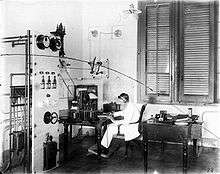Telegraphist
A telegraphist (British English), telegrapher (American English), or telegraph operator is an operator who uses a telegraph key to send and receive the Morse code in order to communicate by land lines or radio.

Telegraphist was one of the first "high-technology" professions of the modern era. Many young men and young women left their farms and fishing communities in the late 19th century to take high-paying jobs as professional telegraph operators. In those early days telegraphers were in such demand that operators could move from place to place and job to job to achieve ever-higher salaries, thereby freeing them from subsistence lives on family farms.
During the Great War the Royal Navy enlisted many volunteers as radio telegraphists. Telegraphists were indispensable at sea in the early days of wireless telegraphy, and many young men were called to sea as professional radiotelegraph operators who were always accorded high-paying officer status at sea. Subsequent to the Titanic disaster and the Radio Act of 1912, the International Safety of Life at Sea (SOLAS) conventions established the 500kHz maritime distress frequency monitoring and mandated that all passenger-carrying ships carry licensed radio telegraph operators.[1]
High-paying jobs as seagoing ship's radiotelegraphy officers were still common until the late 20th century. In the 21st century, the employment of professional radio telegraphers was largely discontinued in maritime service and replaced by the use of satellite communications services.
The use of Morse code is over a century old. Fluent Morse code telegraphers still enjoy sending Morse code using manually operated mechanical keys or electronic keyers. Although Morse code is no longer used in commercial practices, the use of hand-sent Morse code seems to be growing among amateur radio operators, even though Morse proficiency is no longer required to obtain an amateur radio licence.
Using the computer keyboard or hand-operated telegraph key, today almost all Morse code operators are amateur radio enthusiasts.
In popular culture
- The telegraphist mouse in Australia and the Marshall Islands from The Rescuers Down Under.
See also
- Amateur radio
- Casa del Telegrafista (House of the Telegrapher), a museum in Colombia
- Commercial Cable Company
- List of telegraphists
- Morse code
- Prosigns for Morse code
- telegraph key
- Transatlantic telegraph cable
- Sinking of the RMS Titanic
References
- International Convention for the Safety of Life at Sea, 1948, London, 10th June, 1948 (PDF), London: Her Majesty's Stationery Office, January 1953, p. 169